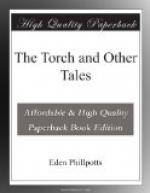In a word, my purpose was to put the paper back in his path again, afore he got home; and not only that, but I meant to speak a word or two—just a voice he should hear out of the night. I might save his soul, and, whether or no, ’twas a sporting idea to try to do so. So I set to work, and even in them exciting moments I thought what strange messengers the Lord do choose to run His Almighty errands.
I knowed the way the young chap had to go, and how long ’twould take. Two miles from the river lay Woodcotes, and, by following over a hill and dropping down t’other side, I could get in his track again and be at the edge of the home gardens where he’d come out. I saved half a mile going that way, and would be able to get there long afore him.
Of course, all this went through my head a lot quicker than I set it down. Like a flash came my determination, and I acted on it, and ran through the night and headed him off, and hid in a rhododendron bush just by the main drive, where he’d leave the woods on his way home. And right in his path, where his feet must go, I’d put the tin canister. ’Twas dry again, and flashed in the moonlight so bright that he couldn’t miss it nohow.
Still as a mouse I waited for him, and just over my head hooted an owl. “Hoo-hoo-hoo! Hoo-hoo-hoo-hoo!” he shouted out; and another, long ways off, answered to him.
What should I say? was the question in my mind while I waited for Mr. Champernowne. And first I thought I’d say nothing at all; but then I reckoned ’twould be more solemn and like a miracle if I did. I minded a thing my father used to speak when I was a li’l one. He’d tell it out very serious, and being poetry made it still more so. “Don’t you do it, else you’ll rue it!” That’s what my father used to tell me a score of times a day, when I was a boy, and the words somehow came in my mind that night. Therefore I resolved to speak ’em and make ’em sound so mysterious as I could, just when the young fellow found the canister.




